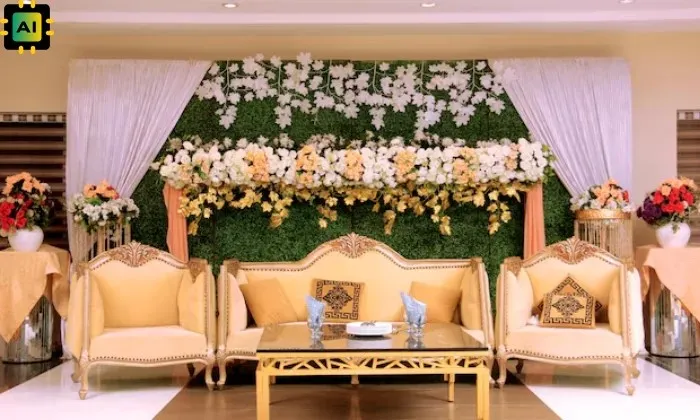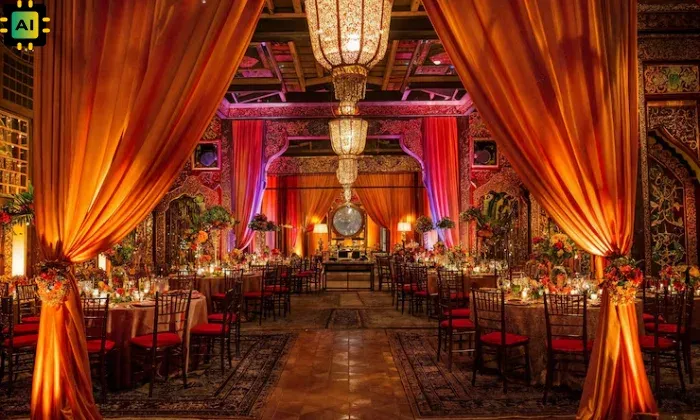Secrets of a Smooth Wedding: How Vendors Work Together
 Wedding Planning
Wedding PlanningSecrets of a Smooth
Wedding: How Vendors Work Together
Wedding has always been
more than just celebrations; They are a pleasant mix of love, culture,
tradition and art. Magic lights, beautiful dress, intimate music, delicious
food and behind the perfect moments are a team of suppliers that make it
possible. A steady marriage is not only random-this is a carefully orchestrated
effort where many suppliers work together as parts because of a well-tied
orchestra.
In this article, we will
highlight the secrets of an even wedding, find out why the seller collaboration
is needed, dive into the importance of marriage, weigh professionals and
oppositions that weigh, touch on historical aspects and react the most common
FAQ. Whether you are preparing for your big day or wanting to establish wedding
planner procedures, this article will give you a deep understanding of the
wedding transmitter.
What does the seller's
collaboration mean at a wedding?
The seller collaboration
refers to the possibility of various professionals - such as photographers,
florists, caterreas, DJs, decorators, events and makeup artists - to work in
harmony - to ensure that all aspects of the wedding are performed innocent. Like
rituals and procedures in a traditional wedding where each custom means and
time, suppliers should also follow a structured sequence.
For example, the
photographer cannot capture the "first appearance" moment without
coordination with the makeup artist, or Cactor must coordinate with the event
manager to ensure that the food is served at the right time between rituals
such as "sat Phere" (seven holy firmly "(seven holy firm))
or" exchange of exchange ".
Why is this necessary?
Marriage occurs once in
life with events for couples. There is very little room for errors, and even
small accidents can cause chaos. The seller is in the need for cooperation:
Time management - every
ritual or event from Mehndi to reception requires a restriction of time.
Guest experience - smooth
infections between events make wedding memorable.
Cultural honor - rituals
such as Garland Exchange, Call Functions or "Bidai" must be performed
on time and require accurate coordination.
Stress-free
celebration-well coordinated supplier team ensures that couples and families
enjoy the day without unnecessary concern.
The importance of seller
coordination at wedding
The importance of
suppliers who work together is as important as the sacred ritual itself. A
marriage symbolizes Sangh and society, in many cultures. This feeling of device
should be reflected among sellers.
For traditions: Indian
weddings with turmeric, mehndi, barate and reception require many suppliers who
originally work in days.
For efficiency: Western
weddings along with practice, VU stocks and reception also required an accurate
deadline.
For memories: The sellers
ensure that your rituals are properly documented, decorated, observed and used
to.
When the sellers
cooperate well, it seems that the story repeats - in ancient times the
communities came together to help each other get married. Then cooked,
decorated neighbors, decorated and sung; Today, professional sellers repeat
this team work on a large scale.
Professional and
resistance to seller cooperation
Pros:
Innocent execution of
rituals and events.
The minimum voltage for
couples and families.
Time skills - no delay in
ceremonies that round or cake cutting.
Better communication
between the teams, reduces the surprise at the last minute.
Increased guest
satisfaction -Finally food, music and photography coordination.
Cons:
High planning efforts -
Detailed meetings and practice require.
Addiction to teamwork -
if a seller fails, others may be affected.
Costs can increase - the
time invested in coordination can mean additional fees.
Potential personality
collision supplier can have different work style.
Historical Relevance of
Wedding and Supplier's Cooperation
Traditionally, marriage
was completely socialized. In Indian history, villagers participated in
cooking, song and decoration. In Europe, community members gathered to make
banquet and music. Suppliers, as we know them today, changed common roles.
The story of the seller
collaboration shows the development of weddings:
Antique rituals:
Community -controlled support.
Medieval Times: Royal
Weddings with assigned chefs, musicians and decorators.
Modern times:
Professional sellers specialized in photography, decoration, diet and
logistics.
This historical lens
shows that the seller cooperation is not new - it has only evolved in a
professional industry.
The secret of a steady
marriage: Innovative idea for seller communication
Use a shared travel
program trilo or wedding-specific app as digital tools where suppliers can
check the deadline in real time.
Sellers before the
wedding organize "Seller Test Dinner" just like the family's exercise
dinner.
Seller Buddy System -
Couple seller (eg photographer + decorator) so that they coordinate for direct
moments.
Make a plan in case of
emergency protocol-bijli cuts, rain or delay at the last minute.
Rituals pledge implement
-like joints, sellers can go through rituals such as ferrous, ring exchange or
music performance.
Quiet communication code
- DJs, photographers and planner can use hand signals or sound signs, which
should sink without disturbing rituals.
Cultural sensitivity
orientation - Volume Mangalsutra, educators about rituals such as Christian
Feast or Islamic Nika so that they respect time.
Seller lounge - a
designated seller area ensures that they relax and charge without leaving the
place.
Encourage cross
-sectional strategy to promote each other on social media, create unity and
benevolence.
Sellers after weddings
stay in contact for circular-proven events, referral and steady cooperation.
FAQ
Q1: Which sellers are
most important for marriage?
A: Important suppliers
include wedding planners, photographers, business, decorators, makeup artists
and musicians/DJs. Based on traditions, priests or officers also play an
important role.
Q2: Do the sellers
communicate directly with each other?
A: Yes, professional
suppliers often coordinate directly, especially through a wedding planner or
through a shared deadline.
Q3: How soon will the
suppliers be ordered?
A: 9-12 months before
marriage, especially for the high season.
Q4: Can suppliers adapt
to cultural or religious rituals?
A: Absolutely.
Professional suppliers are usually informed of traditions such as Suts, Nika or
Christian promises.
Q5: What if a supplier
fails to distribute?
A: Backup plans and
contracts ensure that other suppliers can tread quickly or adapt quickly.
Q6: Is a wedding planner
necessary for seller coordination?
A: Not mandatory, but
highly recommended. A planner is a central communicator and ensures that all
suppliers are in the sink.
Q7: Can couples help
suppliers work evenly?
A: By providing clear
deadline, cultural panties and by respecting professional competence.
Q8: What role does
technology play in the seller collaboration?
A: App, WhatsApp Group,
shared calendar and digital contracts streamline communication.
Q9: Are the sellers extra
coordination costs?
A: Some suppliers may
charge for extended meetings or practice, but even execution usually takes over
the costs.
Q10: Can the seller
cooperation improve the memories of marriage?
A: Yes, the seamless team
work ensures better photography, smooth rituals and more relaxed couples,
creating a lifelong nourized memories.
Blog Category
Popular Blogs
-min.webp)
Top Bridal Entry Ideas: Unique and Memorable Ways for Indian Brides
5 Jul, 2024

10 Unique Couple Outfit Colors for Sangeet Ceremony
2 Aug, 2025

Marriage Home in Alwar: Dream Wedding Hub
4 Nov, 2025

Harmonies of Love Top Trending Wedding Songs in 2025
9 Oct, 2025
.webp)
Best Wedding Venues in Alwar : Dream Wedding Hub
25 Oct, 2025

Best Wedding Venues In neemrana (alwar)
31 Oct, 2025
.webp)
Best Wedding Venues in Rajgarh : Dream Wedding Hub
31 Oct, 2025

Wedding Venue in Malviya Nagar (Jaipur): Dream Wedding Hub
23 Oct, 2025

Wedding Venue in Bassi (Jaipur) : Dream Wedding Hub
23 Oct, 2025
 (1).webp)
Best Wedding Venues in Alwar
25 Oct, 2025